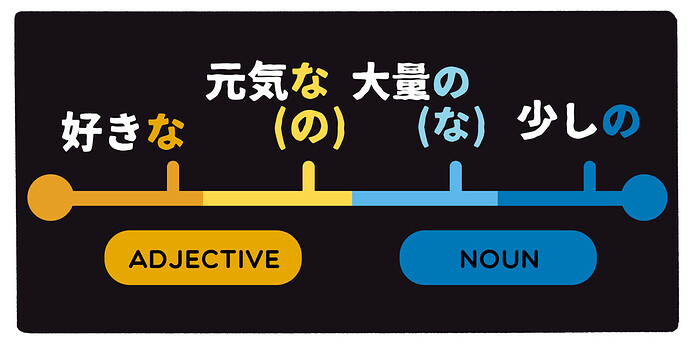For this example/question… shouldn’t 人気 be used as a noun? So 「人気があります」?
They both mean the same thing.
とても人気があります would also be correct. Both formulations work.
That usage is a noun AFAIK.
Same way you could say 「私の父はペンキを飲むので、とても変人です。」
EDIT: actually no that is a bad comparison cuz “popular” is an adjective in English whereas “weird person” isn’t.
I think the confusion comes from 人気 not being an adjective in Japanese
Yeah, I had previously learned from Wanikani that 人気 is a な-adjective. But apparently that isn’t true, so Wanikani is just teaching the wrong info there I guess.
Pretty tricky though that the direct antonym, 不人気 is a な-adjective while 人気 isn’t.
Edit: I seemed to remember reading it on Tofugu too so I looked it up. In this article and this article 人気 is described as a な-adjective, and used in that manner in example sentences. Odd.
Don’t also forget that being a の and な adjective is more like a spectrum than a pure dichotomy.
Same thing for い and な adjective. One of the most frequent example is 小さい, which can be used as 小さなもの or 小さい!
Source, more on that : The Guide to Na-Adjectives and "So-Called" No-Adjectives
Don’t forget the key element : Grammar try to describe a language, but what really defines it is how the language is used  So nuances like this is not completely unexpected.
So nuances like this is not completely unexpected.
That’s why I specified with ”な-adjective”, I know 人気 is a の-adjective.
Just seems weird to me that Wanikani / Tofugu would classify 人気 as something that isn’t in line with it’s dictionary definition.
Edit: To further specify I’m not talking about real-life usage. I’m talking about Wanikani presenting it like 人気 having the dictionary classification of な-adjective.
I understand practical usage is more nuanced.
I didn’t find a statement of where WaniKani got its definitions from, but many places pull from JMDict (including Bunpro). Tofugu’s about page claims this:
In 2011, Viet Hoang joined as our first developer and helped co-found WaniKani
人気/にんき’s a level 4 out of 60 on WaniKani, so I’m guessing it was an early entry around that time.
JMDict search for active approved entries with an exact match for 人気
→ JMDict’s entry for 人気/にんき
On JMDict’s entry’s page, there’s a change from 2020-07-24 that removed adj-na from the “part-of-speech info”. It also makes mention of 人気的な as the only finding with な:
click to expand change details
- A* 2020-07-24 14:11:55 Nicole Rauch <…address hidden…>
Refs:
I took my information from http://nlt.tsukuba.lagoinst.info/headword/N.00510/ which does not list any usage of 人気な; the only usage as な-adjective is in the form 人気的な.Comments:
I could not find any evidence that this word is a な-adjective, therefore I request that this part should be deleted.Diff:
@@ -19 +18,0 @@
-&adj-na;
For convenience only:
- JMDict’s entry for 人気/にんき
- Bunpro’s entry for 人気/にんき
- WaniKani’s entry for 人気/にんき
- JMDict search for active approved entries with an exact match for 人気
- JMDict search for active approved entries containing 人気
tl;dr: I think WaniKani and other sources that mention 人気 as a な-adjective are doing so based off of JMDict’s definition prior to 2020-07-24.
That’s good sleuthing, and thank you for adding context. Since I apparently didn’t make it clear enough initially what I was trying to point out.
@soundjona , you bring up a great point about nouns being on a spectrum of how “adjectivey” they are but I just want to offer a small correction on the below point (sorry for the pedantry in advance - I am writing just in case someone is using this thread as a reference for learning).
小さな is a 連体詞 (pre-noun adjectival), not a 形容動詞 (“na-adjective” or adjectival noun). I won’t go deeply into it but, as the name suggests, a pre-noun adjectival has to come before a noun (and you can’t drop or conjugate the な part). I think most people pick this up intuitively but aren’t aware that a separate term exists for this type of word so it is pretty easy to miss!


